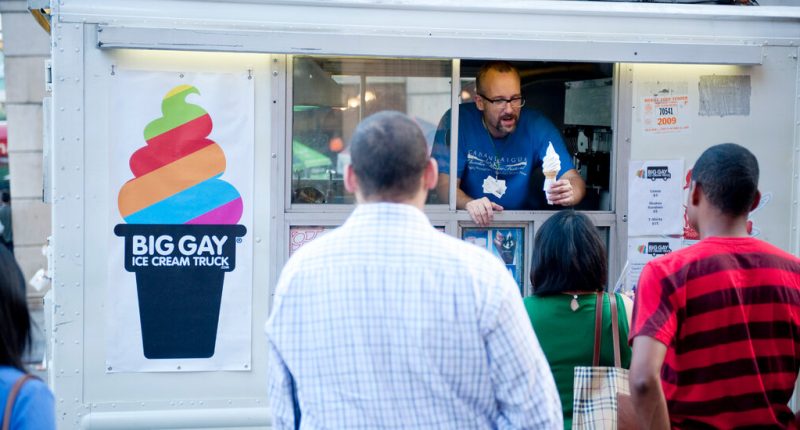
It was all rainbows and unicorns for a while. But like many fun ideas, Big Gay Ice Cream has wound up in debt and in court.
After a rollicking rise that leveraged queer identity as a brand strategy, opened seven shops in the Northeast and landed its products in supermarkets nationwide, the New York City-based soft-serve chain is down to just one location. On Friday, a founder and partner, Doug Quint, filed a lawsuit in New York State Supreme Court accusing another partner, Jon Chapski, of mismanaging the company and fraudulently collecting government loans during the pandemic.
On Tuesday afternoon, through a spokesperson, Mr. Chapski said only that he was reviewing the lawsuit with his lawyer and would respond “when appropriate.”
In 2009, when the Big Gay Ice Cream Truck first rolled into the annual Brooklyn Pride parade, it caught a wave of pop culture that included hits like “RuPaul’s Drag Race,” Lady Gaga’s “Born This Way” and “Orange Is the New Black,” and marked a national shift that culminated in the legalization of marriage for same-sex couples across the country in 2015.
The company’s first shops exploded in Greenwich Village in a burst of rainbow sprinkles. Locals and tourists alike thrilled to the cheeky branding (Barbie dolls, glitter, “Golden Girls” references) and made pilgrimages for Bea Arthur swirls and Monday Sundaes.
Mr. Quint and Bryan Petroff, the avuncular (and gay) founders, went on to draw a mainstream following that helped make “don’t ask, don’t tell” a thing of the past (in food marketing, at least). In 2017, Nestlé began distributing the company’s hard-pack ice cream in supermarkets nationwide; People magazine covered the introduction of three new flavors in 2019.
“I thought Big Gay was my life’s work, the thing I was meant to do,” said Mr. Quint, who gave up his decades-long career as a classical musician in 2011, when the business had two profitable stores and he had secured a six-figure deal to write the cookbook “Big Gay Ice Cream: Saucy Stories and Frozen Treats.”
During the pandemic, though, the good vibes evaporated. Today, after multiple missteps, unpaid debts and evictions, the company’s future is murky. Mr. Quint is working in a Walgreens pharmacy in Pittsfield, Maine, where he grew up. Mr. Petroff works in human resources for a New York restaurant chain.
Both men say they hope to pull the company back from the brink and continue without Mr. Chapski, whom they hired as a financial adviser in 2011 and made a partner in 2016. The founders continued to develop new products and marketing efforts, but Mr. Chapski effectively ran the business.
Mr. Quint is seeking at least $4 million, claiming damages arising from breach of contract, fiduciary irresponsibility and “willful misconduct” by Mr. Chapski. (Mr. Petroff, who like Mr. Quint still retains a 35 percent ownership stake, has declined to be a party to the suit, citing the expense of legal representation, but said Mr. Quint had his “full support.”)
In his lawsuit, Mr. Quint accuses Mr. Chapski of failing to pay landlords, vendors and the I.R.S.; concealing legal proceedings and business moves from him and Mr. Petroff; and collecting government loans during the pandemic while the stores remained closed and employees went unpaid. Public records show that the four New York City stores — each of which is a separate limited-liability corporation — received loans totaling more than $500,000.
Mr. Quint said in an interview that Mr. Chapski has maintained his lifestyle even as the company has descended into debt. Mr. Chapski and his wife, Agnes, a former publisher of In Style and Allure magazines, own a 2,000-square-foot loft in TriBeCa and a beach house in Montauk, N.Y. (The beach property went into foreclosure on Aug. 14, according to documents filed in Suffolk County Supreme Court.)
The one remaining ice cream store, on the Upper West Side of Manhattan, is operated by Jeremy Wladis, a longtime neighborhood restaurateur. On Friday, Mr. Wladis said he had been granted permission to use the Big Gay brand and recipes by Mr. Chapski, who repeatedly assured him that the founders were no longer involved.
Mr. Wladis told The Times that he felt uneasy about the arrangement and tried many times to contact them directly, but never got a reply. Mr. Quint and Mr. Petroff say that was because Mr. Chapski had secretly blocked their access to company email and social-media feeds.
The company began as a summer-job lark when Mr. Quint and Mr. Petroff outfitted an old van, created a menu of bedazzled soft-serve treats and sailed it to Prospect Park as the Big Gay Ice Cream Truck.
Zac Young, now a Food Network star and then the pastry chef at Butter in NoLIta, said he felt equal parts shock, fear and pride when the truck rolled out: “I thought, you can’t do that, you can’t say that!”
Restaurant kitchens were rife with homophobic abuse, he said, and even the traditional “pink ghetto” of pastry operations was usually run by straight white men (though women and gay men often carried out the pastry chef’s vision).
The company’s rapid rise “proved to me that you could be queer and open in the food space, and still be safe and loved,” Mr. Young said.
Not everyone was a fan. Some L.G.B.T.Q. people balked at the upbeat marketing of a community still enduring hate. Bill Yosses, the pastry chef at Blue Hill at Stone Barns, said, “It trivializes the real struggles that gay people have endured.”
Christina Tosi, the pastry chef and founder of the Milk Bar dessert shops, had just started working at the New York restaurant Momofuku when Big Gay first rolled out. “They had a commitment to flavor and creativity and humor that carved out space for us all,” she said.
She went on to build an empire on innovative tastes like cereal milk-flavored soft-serve. “People’s willingness to cannonball and take a chance comes from them,” she said.
The Big Gay Ice Cream stores in the East Village and West Village flourished. The truck toured the South, drawing crowds in Atlanta and Charleston, S.C. A Philadelphia shop followed, along with local high-profile New York locations like the South Street Seaport and Madison Square Garden.
As the business expanded, the two founders relied on Mr. Chapski’s consulting company, Edible Assets, for bookkeeping and financial management.
In the 2016 partnership agreement, Mr. Quint and Mr. Petroff each retained a 35 percent share in the company, with the remaining 30 percent held by Edible Assets. That same year, they signed an amendment that gave Mr. Chapski “final authority and unilateral decision-making power over all financial matters,” while granting the same power to Mr. Quint and Mr. Petroff for the “creative direction” of the company.
“We were so naïve,” Mr. Quint said ruefully, acknowledging that he and Mr. Petroff willingly entrusted Mr. Chapski with both their corporate finances and personal livelihoods.
But once Mr. Chapski was made a partner in Big Gay, according to the founders and three former employees, he pushed for growth that the company’s income and infrastructure could not sustain.
“He was always talking about being the next Starbucks,” said Gary Hernandez, a longtime manager who resigned in 2019.
Big Gay’s trajectory is not unusual in the food world. After a rapid rise in popularity and collaborations with Disney and Marvel, the Brooklyn ice cream darling Ample Hills was bought by a venture capital firm and forced into bankruptcy.
Mr. Hernandez said that Mr. Quint and Mr. Petroff were not involved in Big Gay’s day-to-day operations or financial matters, and that after the company began expanding, chaos, conflict and angry calls from vendors and landlords became common. “That’s when stuff started going haywire,” he said.
Even so, by 2017, the brand was strong enough to earn a coveted place in supermarket freezers, with pints sold nationally at stores like Safeway, Wawa and CVS.
Mr. Quint was walking his dog when his sister first sent a photograph of the pints at the market in his rural hometown. He packed the car and drove straight to Maine. “I had to see it with my own eyes,” he said. Then, he said, he went to the dumpster out back and cried for the miserable gay teenager who had fled to New York to study music in 1989.
“I ran from this place when I was 17,” he said. “I could never have imagined ending up back here.”
But in 2020, with the stores closed indefinitely under lockdown, Mr. Quint says he was forced to move out of New York, taking a minimum-wage job at a CVS. In 2021, the flagship store in the East Village closed; soon after, the company was evicted from its shops in the West Village and Philadelphia. (For the West Village store alone, the back rent owed was nearly $400,000, according to court documents.)
Without his knowledge, he said, federal loan money was flowing in while judgments and summonses were piling up on the doorstep of his unoccupied apartment. “What we didn’t realize is that creative control is meaningless, if the money is all up to someone else.”
Follow New York Times Cooking on Instagram, Facebook, YouTube, TikTok and Pinterest. Get regular updates from New York Times Cooking, with recipe suggestions, cooking tips and shopping advice.
Source: | This article originally belongs to Nytimes.com









